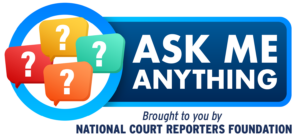By Geanell Adams
Many students will tell you they are practicing. The question you should ask them is: How are you practicing? For practice to be effective, it must also be meaningful, deliberate, and intentional. This article will assist you in creating meaningful practice sessions to help you achieve success that can be measured and lead towards desired success. Meaningful, deliberate, and intentional practice sessions include finding compatible practice partners, scheduling a designated weekday and time to practice, scheduling an extended weekend time to practice, creating virtual accountability sessions with practice partners, reading notes after each practice session, writing briefs and phrases daily, and eliminating distractions.
While in court reporting school, one of the things that was effective for me were the peer practice sessions. A group of us would leave school on Saturdays at noon or on evenings when we did not have class and meet at my apartment. We would all sit around with our machines and practice. We shared our challenges, our opportunities, our strengths, and our weaknesses. We learned tips and tricks from each other, and we supported and encouraged each other. With the changes in technology over the last 20 years, there are so many opportunities for students to realistically do this.
Set aside a day or two with your practice partners. After selecting your day(s), select a time amenable to all. Designate a person each week to host and lead the sessions. This person will be responsible for reminding others and scheduling the Google Meet, Zoom session, or video conference, for example. These sessions are considered virtual accountability sessions. During the first 10 minutes, each member should check in, highlight an accomplishment for the week, then mute their microphones and begin writing, reviewing notes, reading back, editing, and grading – whatever your individual focus for practice is.
Another effective practice tool is to manually write briefs and phrases in steno. One way to remember briefs and phrases is to write them by hand. While moving through school and working towards my RMR, CRR, and CRC, I would manually write each brief and phrase eight to ten times in a journal. This helps you remember them because as you hear them, you visualize what the strokes are without having a delay of mental recall for them. Again, with social media sites for reporters and realtime writers, there is a bank of briefs and phrases available already that will minimize your research time to look them up – requiring you to only to have to write them.
When scheduling individual practice time, select a time that is reasonable and achievable. It can be early morning or late night when you don’t have distractions. It can be during your lunch break at work. It could also mean sitting in the laundry room while doing laundry because no one is sure to want to help with laundry. Whatever opportunity presents itself on a regular basis for you to set aside when you are not distracted, use it. It is very easy to have time allocated for many other things as well as subconsciously finding other things to do in lieu of practicing. Ultimately, you must make a personal decision of prioritizing your goals for career success and committing to achieving them.
While these were only a few tips offered, this nudge is to encourage you to perform a self-reflection. Determine what works for you when practicing. Create practice sessions that help you achieve your goals. Again, they should be deliberate and intentional. They should be attainable, measurable, and timed. Mark them on your calendar and don’t sacrifice that time for anything else. At the end of the day, this is for you; and the only way to get there is by putting one foot in front of the other or one finger next to the other. Happy practicing!
Geanell Adams, RMR, CRR, CRC, CRI, of Raymond, Miss., serves as workforce coordinator for Central Mississippi Planning and Development District and an adjunct instructor for Hinds Community College. She can be reached at geanelladams@aol.com.











